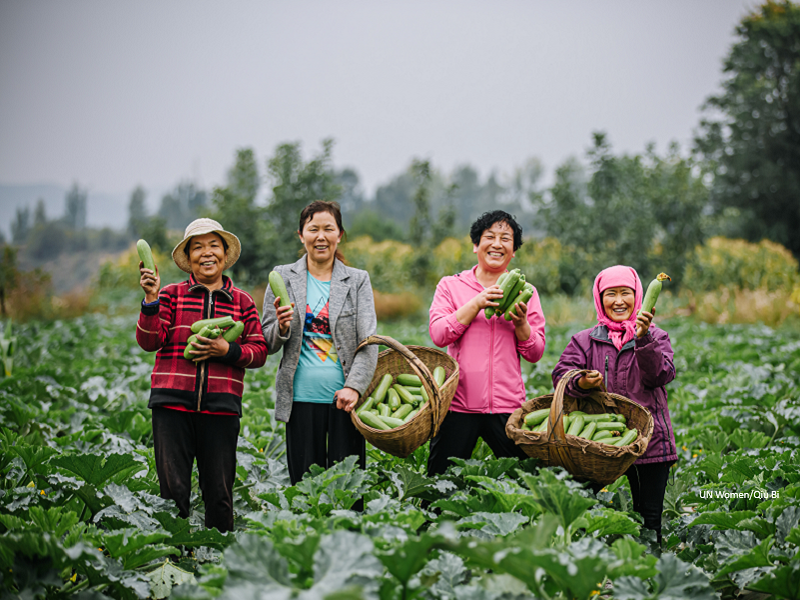Across Asia and the Pacific, UN Women promotes gender equality and women’s empowerment. UN Women implements programmes (including normative and advocacy) in 41 Member States in the region through direct implementation as well as implementing partners, which include government entities, non-governmental organizations, private sector, UN agencies and non-UN intergovernmental organizations. LEARN MORE >
Key focus areas
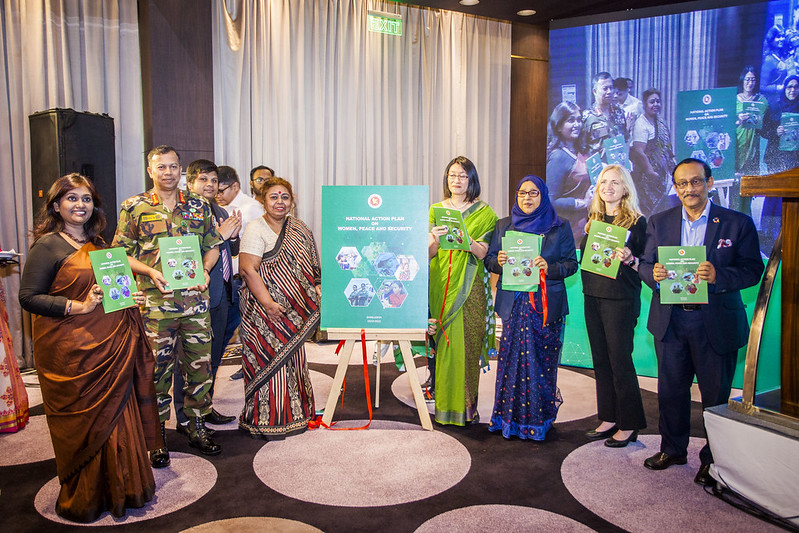
Women, peace and security
UN Women Regional Office for Asia and the Pacific promotes the meaningful participation and leadership of women in traditional and non-traditional peace and security processes, thus contributing to sustainable peace and resilience. The persistent obstacles to the women, peace and security (WPS) agenda and emerging challenges have delineated priority areas: conflict prevention and building peace and resilience; the development and implementation of WPS National Action Plans; and addressing emerging non-traditional security issues, e.g., climate insecurity, cybersecurity, and emerging technologies.
Women's economic empowerment
UN Women promotes women’s economic empowerment in the Asia-Pacific region by advancing gender-responsive business conduct through the implementation and uptake of the Women’s Empowerment Principles (WEPs); creating gender-responsive entrepreneurship ecosystems for micro, small and medium enterprises (MSMEs); transforming the care economy through solutions that help implement the 5R framework; and fostering safe migration to create decent work opportunities for women migrant workers.
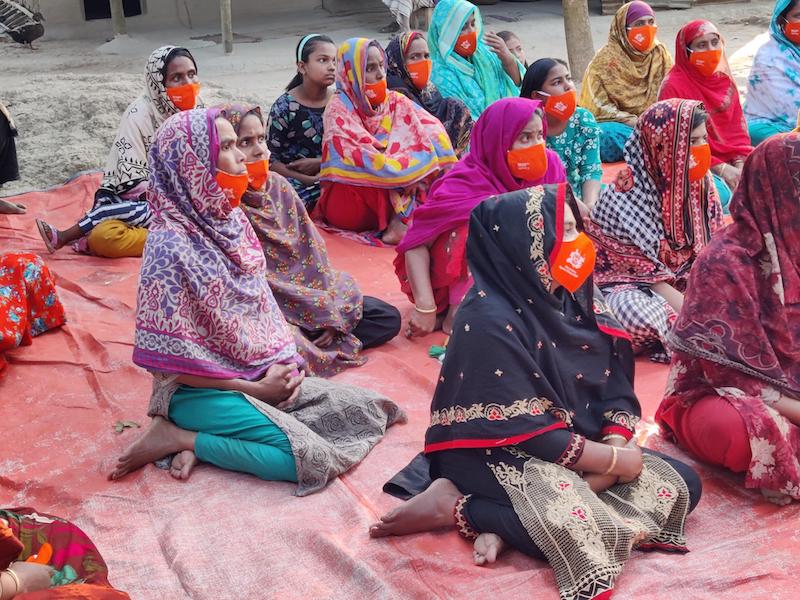
Ending violence against women
UN Women ROAP advances the prevention of and response to violence against women and girls (VAWG) in collaboration with a wide array of partners. Prevention initiatives focus on addressing harmful gender norms and stereotypes and supporting healthy relationships—before violence begins. Response initiatives aim at improving the quality and access to essential services for VAWG survivors, enabling the legal environment, and creating safe public and private spaces, including online, with a focus on putting survivor experiences and advocacy at the centre.

Humanitarian action, disaster risk reduction, and climate change adaptation
UN Women ROAP strengthens the integration of gender equality and social inclusion in humanitarian action. It promotes women’s leadership and gender-transformative approaches in climate action and disaster risk reduction, response, and resilience. As climate change increases the frequency, intensity, and unpredictability of disasters and drives humanitarian needs in the Asia Pacific region, women and girls continuously face disproportionate impacts. With evidence on the gendered dimensions, UN Women promotes the integration of climate-related interventions and resilience-building across all impact areas.
UN Women Regional Office for Asia and the Pacific addresses emerging non-traditional security issues such as climate insecurity, cybersecurity, and technologies. Through the project Women, Peace and Cybersecurity: Promoting Women’s Peace and Security in the Digital World, UN Women is supporting meaningful participation of women in cybersecurity decision-making processes, in the prevention of cyber threats and crimes, and their contribution to cybersecurity governance and digital peacebuilding processes while ensuring that related laws and policies are conflict-sensitive and gender-responsive. UN Women established a civil society network consisting of 19 women civil society representatives and defenders of digital rights across Southeast Asia to support women’s leadership in cyber-related fields by facilitating regional knowledge exchange and leveraging collaboration among champions. Laying the foundation for joint policy advocacy for gender-responsive cybersecurity, the network was supported by UN Women to identify key recommendations for policymakers to consider in ensuring that cyber-related laws, policies and action plans are inclusive, rights-based and responsive to women’s needs. The recommendations were compiled into an advocacy brief which has been at the centre of numerous high-level policy dialogues on this topic. For instance, the recommendations outlined in the advocacy brief were presented at the national-level cybersecurity policy dialogue in Thailand, and their applicability to the Thai policy environment was discussed. These results have leveraged opportunities for women civil society leaders in Southeast Asia to transform national and regional cybersecurity policy- and decision-making while advancing gender equality and women's empowerment through multisectoral strategies, and action plans, where the importance of leveraging women’s leadership in the governance of cyberspace and technological development has been at the core of UN Women’s efforts. Through capacity-enhancing initiatives, the project has equipped women and young women to be more resilient towards online harms and threats while raising awareness of the gendered nature of cyberspace and its implications for the WPS agenda. Through this project, 176 persons (78 per cent women) across Southeast Asia increased their knowledge of gendered cybersecurity concerns, while 298 persons (73 per cent women) h increased their digital literacy skills by the end of 2022. Moreover, significant progress can be seen at the policy level as a result of the project, with the recognition of cybersecurity as a key emerging security issue for ASEAN Member States to consider through the adoption of the ASEAN Regional Plan of Action for Women, Peace and Security, following UN Women’s provision of technical support to the drafting process. This has sparked a national-level interest among States across Southeast Asia to discuss gender and cybersecurity, as well as cybersecurity in the context of women, peace and security.
Web story: Vietnamese Youth Organize Creative Projects to Advocate for a Safe and Equal Cyberspace
Advocacy brief – Cybersecurity in the context of the Women, Peace and Security Agenda (English and Thai)
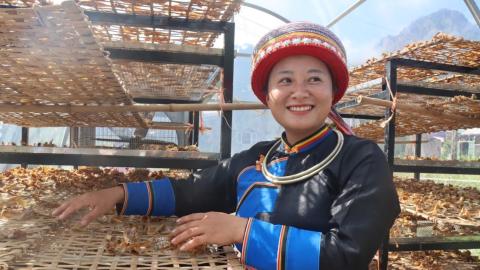
Originally published by The Jakarta Post
The disastrous floods in Pakistan have proven, yet again, that our climate crisis disproportionately hurts women. Of the 33 million people affected, nearly 70 per cent have been women and children, according to the latest United Nations flash appeal. This is just one of the many accelerating, and devastating, climate impacts around the world.
Women face greater demands to care for their families because of social and gender norms, and these demands increase during and after climate disasters. Women spend more time than men gathering household fuel and water and face more barriers in accessing information and resources to prepare for, respond to and recover from disasters. Read more >
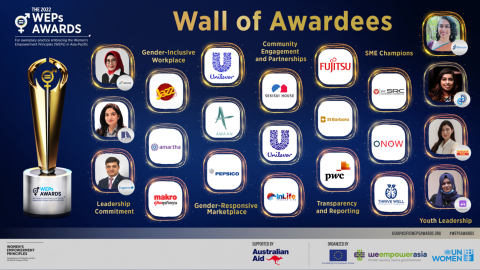
UN Women catalyzes private sector actions to advance women’s economic empowerment and gender equality through the Women’s Empowerment Principles (WEPs), which saw increased commitments, actions and strengthened accountability mechanisms among businesses in the Asia-Pacific region. In 2022, the number of WEPs signatories increased by 408 from 1,665 in 2021 to 2,073.
The 2022 report “Trends and Opportunities to Advance Gender Equality in Business in Asia and the Pacific” provides valuable insights into the progress made by signatory companies in promoting WEPs across supply chains and highlights gaps where actions are still needed. Significant advances were made in companies that used the Gender Gap Analysis Tool (GAT) to make this assessment, and as of 31 December 2022, a total of 851 companies in the Asia-Pacific region have undertaken the tool. Among the surveyed WEPs signatory companies in the region, 71 per cent reported that the COVID-19 pandemic encouraged a rethinking of their diversity and inclusion strategy. They perceive their most notable progress to be on promoting women in leadership, advancing workplace equality, and increasing awareness of gender.
To encourage companies to demonstrate their commitments in action, the UN Women Asia-Pacific WEPs Awards were launched under the WeEmpowerAsia (WEA) programme. Open to private sector organizations of all sizes and categories, the Asia-Pacific WEPs Awards offer them a unique opportunity to showcase their work in advancing women’s empowerment across organizational value chains. Growing in prominence since 2020, there has been an increase in the number of applicants, with 508 applications received in 2022 from 19 Asia-Pacific countries. Applications came from a diverse range of industries, including banking, consumer goods, business support, social enterprises, Chambers of Commerce, IT, and impact investors. The progress over the past three years reflects the increasing number of WEPs signatories in the region that self-identify as having exemplary practices and value receiving recognition for it.
The various categories of the WEPs Awards were both relevant and aspirational, with new examples of employer-supported care and care for supply chain workers. The number of applications for Transparency and Reporting doubled from 2021. The highest number of applications were in Gender-Inclusive Workplaces as well as Community Engagement and Partnerships. To make the Awards more inclusive and to recognize the vital contribution that micro, small and medium-sized enterprises (MSMEs) make to the economy, the 2021 and 2022 cycles added three additional MSME Champions Awards. In fact, 40 per cent of applications in 2022 were from MSMEs.
The WEPs have also been a driving force for policy advocacy. Under the WEA programme, UN Women and ILO developed the Ecosystem landscaping to advance the accountability to implement the Women’s Empowerment Principles in ASEAN. It provides comprehensive details on policy gaps and sets out a clear policy roadmap for the ASEAN Member States to advance more gender-responsive business conduct, with especially clear guidance on reporting and implementing WEPs-related policies. It is being leveraged by ASEAN and UN Women through the ASEAN Public Policy Action Brief under the leadership of the ASEAN Committee on Women. Similarly, the brief on Advancing Gender and Business Reporting was launched at the 2022 ASEAN Summit on Women and is strongly complementary to and will help generate more traction on the WEPs Transparency and Accountability framework.
Using the official WEPs Awards websiteas an interactive knowledge exchange platform and the evidence generated in the form of 16 WEPs in Action and WEPs Leadership Insights case studies, UN Women has been able to leverage the WEPs in the Asia-Pacific as a catalyst for action and momentum at policy and business levels to accelerate business action in advancing gender equality and women’s economic empowerment.
Read more:
Women’s Empowerment Principles in Action Case Studies
WEPs Awards Awardee Profiles from 2021 (but published in 2022)
UN Women Think Piece: Innovations in Childcare to Advance Women’s Economic Empowerment
The UN Women Regional Office for Asia and the Pacific (ROAP) has focused on strengthening institutional capacity in the collection and use of administrative data with regard to violence against women and girls (VAWG). UN Women, the Association of Southeast Asian Nations (ASEAN), the ASEAN Commission on the Promotion and Protection of the Rights of Women and Children (ACWC), and the ASEAN Committee on Women (ACW) developed the ASEAN Regional Guidelines on Violence against Women and Girls Data Collection and Use. In 2022, a key step in this journey was the regional capacity strengthening workshop on the collection and use of VAWG administrative data, organized with country offices and partners. The Guidelines have been translated into five ASEAN languages—Bahasa Indonesia, Khmer, Burmese, Thai and Vietnamese—and integrated into local referral mechanisms such as Standard Operating Procedures. Countries and partners in the region are using these guidelines and, as a result, have the capacity to report on the number of VAWG cases and feed it back to their service provision systems.
An example of improved institutional performance in collecting and using administrative data is an initiative by the Department of Foreign Affairs of the Philippines. As a result of the technical support from the UN Women Regional Office and the Philippines Office, the Department of Foreign Affairs of the Philippines recorded support for 34,481 migrants (22,258 women) as administrative data from July to December 2021. The data was reported from the embassies and consulates in the ASEAN, Middle East and North African regions. After the aforementioned regional capacity strengthening sessions, the Department of Foreign Affairs requested in-depth training on violence against women migrant workers, with a focus on foreign service officials in embassies and consulates who are supporting Filipino migrants abroad. The training focused on gender-sensitive and survivor-centred VAWG data collection, with specific considerations for migrants. After the training, UN Women provided technical support in strengthening the data system of the Department of Foreign Affairs, which has resulted in a systematic and institutionalized data collection that informs policies, programmes and plans.
In Thailand, three local referral mechanisms were established in Bangkok, Chiang Mai and Mae Sot and formalized through local Standard Operating Procedures. They received extensive technical support from both the regional office and the Thailand office in developing and institutionalizing standard in-take forms with the minimum data set required for cases of violence against women, including women migrant workers. These referral mechanisms recorded the support for 76 women migrant workers who experienced violence against women.
The various initiatives for collection and use of administrative data on VAWG over these years have not only supported the ASEAN Member States in advancing their obligations toward international norms and standards, such as monitoring of VAWG-related indicators, but also improved service provision by enabling policies and plans to be better informed by evidence.
Read More:
- ASEAN Regional Guidelines on Violence against Women and Girls Data Collection and Use (available in English, Khmer, Bahasa Indonesia, Myanmar, Thai, and Vietnamese)
- Practical Guide: Developing Standard Operating Procedures (SOPs) for a Coordinated Response to Violence against Women, including women migrant workers
- “The GBV Task Force has changed my life” - strengthening services for survivors of violence in Thailand
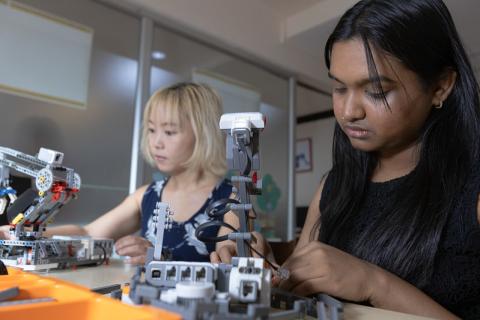
Following the COVID-19 pandemic, digitization rapidly accelerated, which exacerbated a wide array of security risks, digitally facilitated harm and contemporary forms of warfare. Although cybersecurity concerns have been discussed in the context of national security for some time, they have yet to be systematically accounted for in the Women, Peace and Security (WPS) agenda. As a result of UN Women Regional Office for Asia and the Pacific’s efforts to close these knowledge gaps in 2022, stakeholders now have access to an entirely new body of knowledge products on cybersecurity implications for the implementation of the WPS agenda in Southeast Asia. Diverse audiences, including representatives from both government bodies, civil society and academia were reached by the findings from this new body of research through numerous presentations in international, regional and national fora, raising awareness of the importance of the topic and the availability of new resources relevant to the field of cybersecurity. By the end of 2022, a diverse set of at least 1,433 stakeholders, including government representatives, academia and civil society representatives, had been directly reached by information on the linkages between cybersecurity and the WPS agenda. Additionally, close to 5 million people have been reached indirectly by communications and advocacy efforts aiming to raise awareness of gendered risks and opportunities relating to technology and digital platforms.
Read more
Action Brief – From Warfare to Peace building: Employing Artificial Intelligence for Women, Peace and Security
Action Brief: Women, Peace & (Cyber) Security in Asia and the Pacific (English and Vietnamese)
UN Women Project Webpage: Women, Peace and Cybersecurity
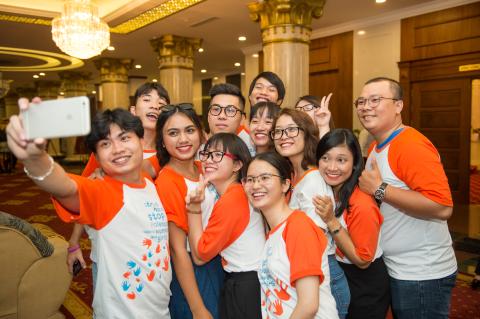
UN Women and the 30 for 2030 Youth Network created the “Youth Guide to End Online Gender-Based Violence (OGBV).” In Asia-Pacific, 88% of women have experienced OGBV, this toolkit enables action from youth to address and prevent OGBV in response to the high prevalence of online violence in this region.
In just under five months, there has been a total of 854 unique downloads. Additionally, UNICEF Indonesia had requested the toolkit be a resource in their U-Report which is a communication tool to ensure young people are always informed and can participate. Additionally, assets and resources in the toolkit were requested by the Ministry for Women, a government department in New Zealand, for their International Women's Day campaign in March 2023. Youth members, including the 30 for 2030 Network, have been using the toolkit as a resource in their own teachings, for example, when teaching girls and women on the ground with their organizations, such as Baithak and The Gender Security Project. The 30 for 2030 Network has used the toolkit to influence further campaigns; the WhatsApp scripts section highlights what Online Gender-Based Violence is and how to recognize it. Finally, an Online Symposium is taking place in August 2023 to launch the second edition of the toolkit with The Center of Excellence. The intention for the toolkit has been to update it annually to reflect current times and tech.
Read more:
Story: Making the internet safer for women and girls: The Youth Guide to End Online Gender-Based Violence
Resource: Toolkit: Youth Guide to End Online Gender-Based Violence
Key achievements
In 2022, UN Women achieved the following results across Asia and the Pacific:
in the region that have signed up to the Women’s Empowerment Principles (WEPs)
with community-based justice providers In Nepal within two years of UN Women’s work
adopted for 12 countries and 2 subregions
are supported to engage in policy dialogue with respective governments for conflict-sensitive and gender-responsive cybersecurity laws, policies and practices
include specific provisions to improve the security and status of women and girls
have increased knowledge and skills on gender equality and human rights in climate and renewable energy actions
